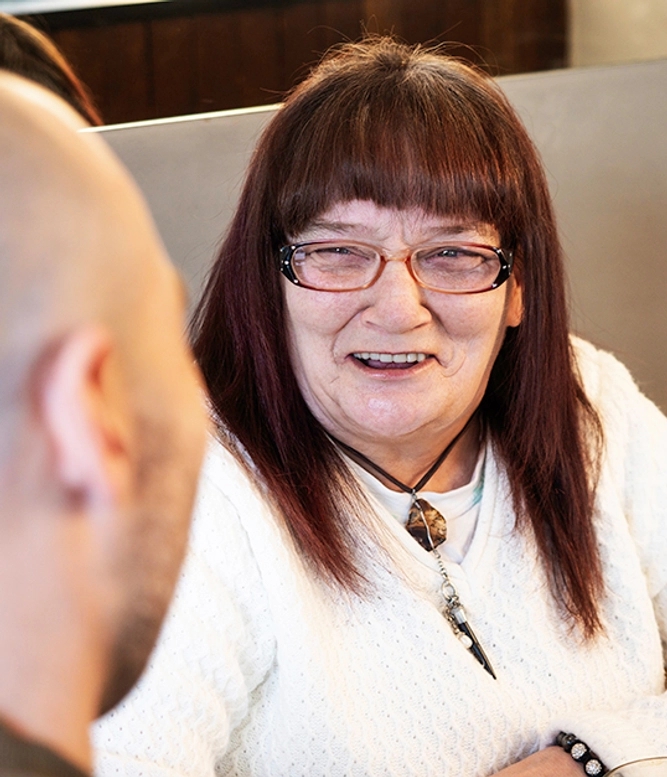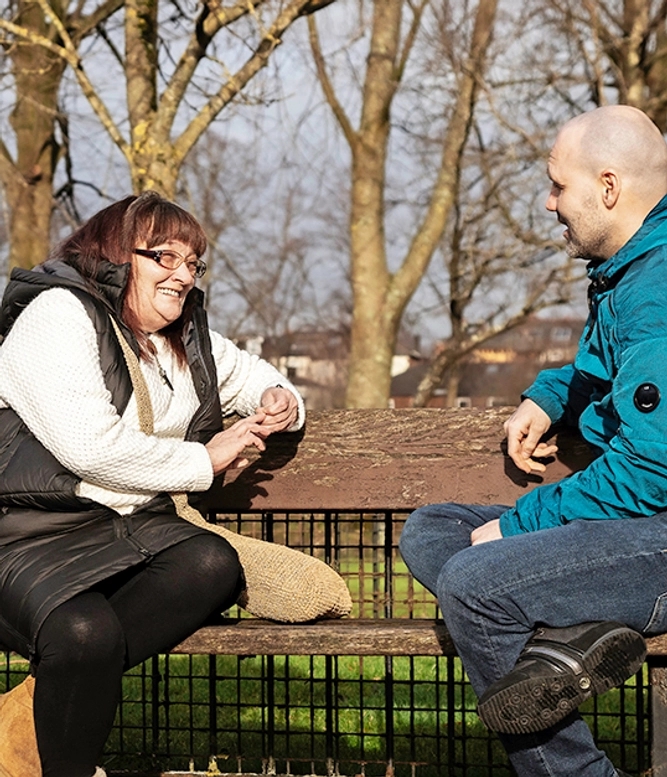opioid dependence
Marie's and Ryan's story

Trauma following a family tragedy was the trigger for Marie’s opioid dependence, with devastating consequences for both Marie and her family.
Today, Marie is rebuilding her life and reconnecting with her family.
A second chance in life
Marie enjoys the simple pleasures in life – sitting in her tidy house, watching the birds through the window while sipping a cup of coffee. Her eldest son Ryan likes visiting and spending a few hours in his mother’s company. But it has not always been like this.
Following the tragic death of her younger brother in 1993, Marie’s life spiraled out of control. “My brother was brutally attacked, and his passing affected me so badly; I just didn’t want to be here anymore”, she explains.
She started drinking heavily, which progressed to taking speed, then cocaine and about 20 years ago she tried heroin.
“The first time it made me violently sick, but I continued – I get addicted very easily”, says Marie.
At that time, Ryan was eight years old. “Life was all right before then, but it changed everything. My mum’s addiction was traumatic for the whole family. I just wanted to live a normal life like everybody else, but it wasn’t like that. I wouldn’t have my friends back to my house as I was embarrassed and ashamed”, he explains.
“Her addiction affected everything in my life including my education. We moved a lot, and I went backwards and forwards between my gran and my mum”, Ryan says.
He explains that he went to many different schools and never really got settled, not having the childhood other kids have. “I had stresses like when’s my next meal coming. I had to become the adult as a child.”
Marie admits that heroin took everything she had.
“Heroin is the beast of all drugs. It didn’t just destroy my life; it destroyed my family’s. But it took a lot of years for me to realize that.”
On one occasion, with just £22 in her pocket, she had to decide whether to buy heroin or dinner for her children. “I picked heroin”, Marie says sadly. “At the time I didn’t care – I thought what I was doing was right.”
Over time, Marie divorced, and she became estranged from her sons. Ryan explains: “I just felt like I had to get out of there – I knew what my mum was doing and I could not sit and watch her doing it.”
It was only when Ryan had children of his own that he fully appreciated how much heroin had taken from his family. He suggested she should start treatment.

Rebuilding her life
Marie has now been in treatment for her dependency for over a year. She volunteers at a food bank twice a week to keep herself busy and is working on rebuilding her relationship with her sons and grandchildren.
“Ryan took me by the hand to go and get treatment. If it hadn't been for him, I would probably still be sitting in a hovel”, she says. “Now I enjoy the simple things. The matter of getting up and making myself a coffee, sitting in comfort instead of sitting in a hole.”
“Today is good – really good. I could not ask for more, especially after what I have put my family through. I have got a second chance in life and I have grabbed it with both hands. And I am going to keep it.”
Symptoms
In addition to cravings, withdrawals and drug seeking behavior, physical symptoms of opioid dependence may include changes in sleep habits, weight loss and decreased libido.
Diagnosis
An opioid dependence diagnosis may be made by a doctor following a formal assessment based on the patient’s history and pattern of opioid use, such as use of heroin, other illicit opioids or prescription opioids.
Management
Treatment and management of opioid dependence need to be individualized and may consist of a combination of different pharmacological and psychological interventions.
Explore more
Learn more about opioid dependence.